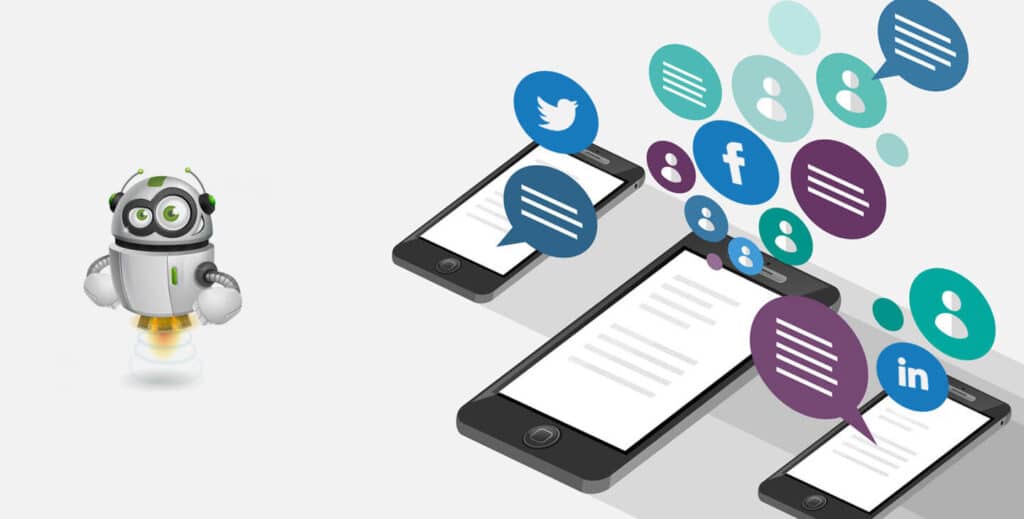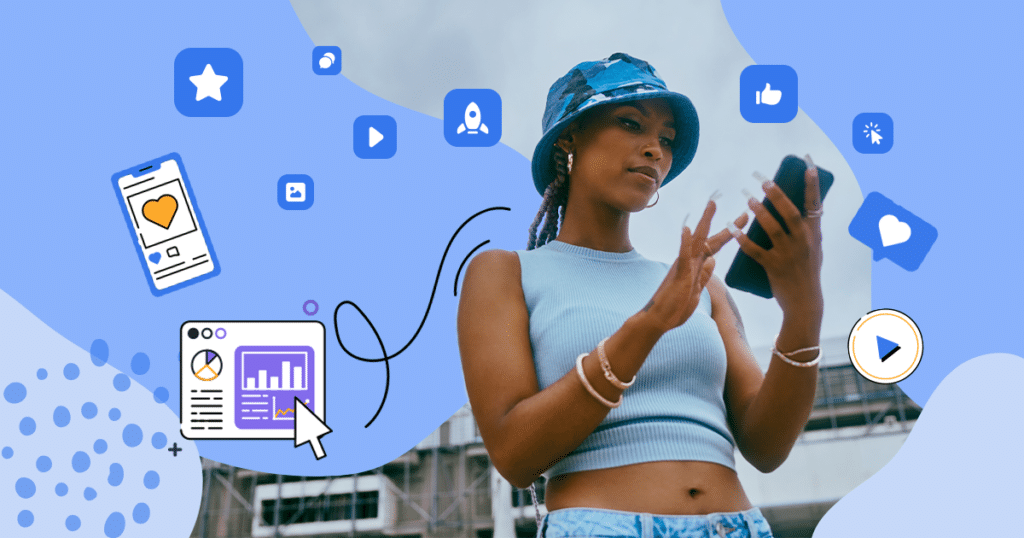It’s hard to talk about anything these days without discussing AI.
Most industries are starting to recognize the benefits of AI, but some people are worried about what that could mean for the future.
While AI is certainly not on the verge of taking over, it is changing the way we think about elements such as marketing and e-commerce.
Overall, AI is a valuable tool, so it’s imperative that brands know how it works and what it can do.
AI marketing is quickly becoming more commonplace, but how can it assist with a brand’s social media marketing strategy? The short answer is that it can help a lot, but the reality is a bit more complicated.
So, let’s dive into the world of AI and see how it could transform your social media marketing.
- What is AI Marketing?
- How Can AI Be Used for Social Media Marketing?
- Advantages of AI in Social Media Marketing
- Downsides and Limitations of AI Social Media Marketing
- Future Trends of AI in Social Media Marketing
- AI Social Media Marketing Best Practices
- AI in the Real World
- Need Social Content to Boost Engagement? Rock Content Can Help!
Download this post by entering your email below
What is AI Marketing?
For the uninitiated, AI stands for artificial intelligence, and it refers to a program that can learn on its own as it receives information.
The more data the software consumes, the smarter it becomes. However, true AI seeks out new information and makes its own decisions based on what it has learned.
When it comes to AI marketing, we’re talking about using AI-enhanced tools that require user prompts to generate responses.
Programs like ChatGPT or MidJourney can use ideas and keywords to produce relevant text or images. So, marketers may use these tools to come up with content ideas, generate complete posts, or add imagery to their existing materials.
How Can AI Be Used for Social Media Marketing?
Social media marketing is the process of promoting a brand across various social media channels.
This type of marketing is often used in tandem with other strategies, such as SEO, email, and PPC advertising.
Since the goal of social media marketing is to build buzz and drive engagement with social posts, there are a few ways that brands can leverage the power of AI.
Let’s break down some examples.
AI Content
Today’s AI programs can’t generate content at the same level of quality that a person would achieve.
However, if a brand needs some quick text or imagery to craft a post, it can turn to AI.
Also, AI content may be a useful foundation that a brand can take to a copywriter or graphic designer to polish and customize.
Since AI fleshed out the initial idea, it’s much faster and more cost effective to have a person take the piece across the finish line instead of relying on people from the beginning.
User Recommendations
Consumers have been interacting with rudimentary forms of AI for a while—specifically, learning algorithms that make recommendations based on previous purchases or likes.
For example, Netflix’s algorithm can generate movies and shows suggestions centered around what a user has already watched.
When it comes to social media, platforms like Facebook and Twitter also use algorithms to determine what posts the users will see first based on their prior activity.
For individual brands, AI can customize these interactions further by assessing which kinds of content will get the most engagement from certain types of users.
Post Automation
One of the most enduring challenges of social media marketing is how much time and energy it takes to post and engage with users regularly.
Brands may feel like they need to be online every day, but automation software can handle most of the day-to-day engagement and let a company focus on other aspects of its marketing strategy.
AI automation is a huge help because it ensures nothing gets overlooked and helps you maintain momentum on social media, so you don’t start losing followers or getting pushed down in the algorithm’s rankings.
Chatbots
AI chatbots like Bing and ChatGPT are making headlines because they’re able to take user queries and generate human-like responses.
Brands can take advantage of advanced chatbots and use them for social media engagement.
While a chatbot shouldn’t handle all interactions on social media, it can take care of a lot of the details involved in maintaining a loyal fan base.
For example, if a user messages a company via social media, a chatbot can provide specific responses and direct the user to the correct department.

Advantages of AI in Social Media Marketing
We’ve covered a lot of the specific ways that AI can help you maximize your social media marketing strategy, but here’s a quick overview of the benefits it can provide:
- Faster Content Creation – While you don’t need to constantly bombard your audience with content, it’s essential to post regularly and maintain momentum. AI can speed up the content generation process so you don’t lose traction.
- Automated Engagement – As your brand grows, you’ll need to engage with a larger audience. AI helps you manage a broader audience and still maintain personalized interactions.
- Scalability – You may only be posting a few times per week right now. Once you tap into the power of AI, you could start posting multiple times per day, even without hiring more staff or social media managers.
Downsides and Limitations of AI Social Media Marketing
Although AI has some incredible benefits, it’s far from perfect.
We’re a long way from just telling an AI program to handle your social media marketing and letting it run by itself.
Here are some disadvantages to keep in mind when determining how much you’ll rely on AI software:
- Limited Knowledge – ChatGPT stopped “learning” in 2020, and other AI software will have similar limitations. So, if you want something current and up-to-date, you’re stuck waiting for the next iteration of the same program.
- Limited Creativity – While AI can generate some decent content, it pales in comparison to what the human mind can create. Overall, AI content is ideal for basic posts or to act as a foundation for human-generated pieces.
- Limited Social Understanding – AI programs don’t understand what’s OK and what’s off-limits, especially when discussing sensitive subjects. Brands have to be extra careful about how these programs interact with users to ensure the software doesn’t make any improper remarks.
Future Trends of AI in Social Media Marketing
As we mentioned, we’re still in the beginning stages of using AI for different purposes, including social media marketing.
When brands and individuals get used to the technology (and as it improves), the future could see some interesting trends, such as:
- Campaign Management – While you may still need to use people for high-quality content generation, AI might be able to take specific goals (i.e., increase the number of followers) and help you reach them.
- Personalized User Experiences – As AI becomes more integrated with social media, you may be able to create individualized marketing campaigns that the algorithm can implement based on user data. So, one person’s interaction with your brand might be completely different from another’s.
- More Reliance on Automation – Brands will likely get into something of an arms race when using social media marketing tools. AI allows smaller companies to stay on par with larger enterprises, so everyone will need to use these programs as efficiently as possible to stay ahead.
AI Social Media Marketing Best Practices
Even if AI was advanced enough to take the lead and start running campaigns by itself, brands would still need to provide oversight. Here are some best practices to follow when deploying AI tools:
- Have Someone Check All Content and Posts – Since AI can’t necessarily handle sensitive issues with the correct level of care, a person should always oversee content to determine if anything seems problematic. Remember, an ounce of prevention is worth a pound of cure.
- Create a Rigid Job Description – As AI becomes more advanced, it will be easy to outsource more tasks. However, you should outline specifically what the program should and shouldn’t do so everyone is aware of how to use it and why.
- Don’t Outsource Everything – While AI is hugely helpful, it’s still just a tool. Don’t rely too much on AI to handle every aspect of your social media campaign. Make sure you still have people interacting with your followers and overseeing the campaign.
AI in the Real World
Knowing about the fundamentals of AI is one thing, but seeing it work in the real world is another. Here are a few examples of brands that have utilized AI to great effect:
- Whole Foods – Imagine being able to walk into a grocery store and walk out with your food without interacting with a single person. Whole Foods implemented this program by using AI to monitor individuals and charge them for their purchases automatically. Better yet, since AI is tracking them already, the store can get real-time data about the items that move the fastest and where they get noticed the most.
- BuzzFeed – BuzzFeed is well-known for creating unique quizzes for its users, but now those quizzes help with data collection and processing. From there, BuzzFeed can curate content based on a user’s responses, not just how they interact with the site.
- Imagine Business Development – Email marketing can be tricky because you need to know when a user is most likely to open and read a message. Fortunately, AI can gather this information and send emails when they have a higher chance of getting read. Imagine Business Development doubled its open and click-through rates using this process, and the results speak for themselves.
Need Social Content to Boost Engagement? Rock Content Can Help!
While AI is slowly becoming ingrained in our daily lives, you still need human-generated content to engage with followers and convert them into paying customers.
Since high-value content will only become more popular as AI pumps out mediocre posts and pages, you’ll need to adapt to keep up.
Fortunately, Rock Content can connect you with writers from all industries to craft blog entries, social media posts, and everything in between.
Best of all, we use AI-powered platforms to help you get the most out of your content ideas. Discover for yourself how AI can help supercharge your social media marketing campaign!







